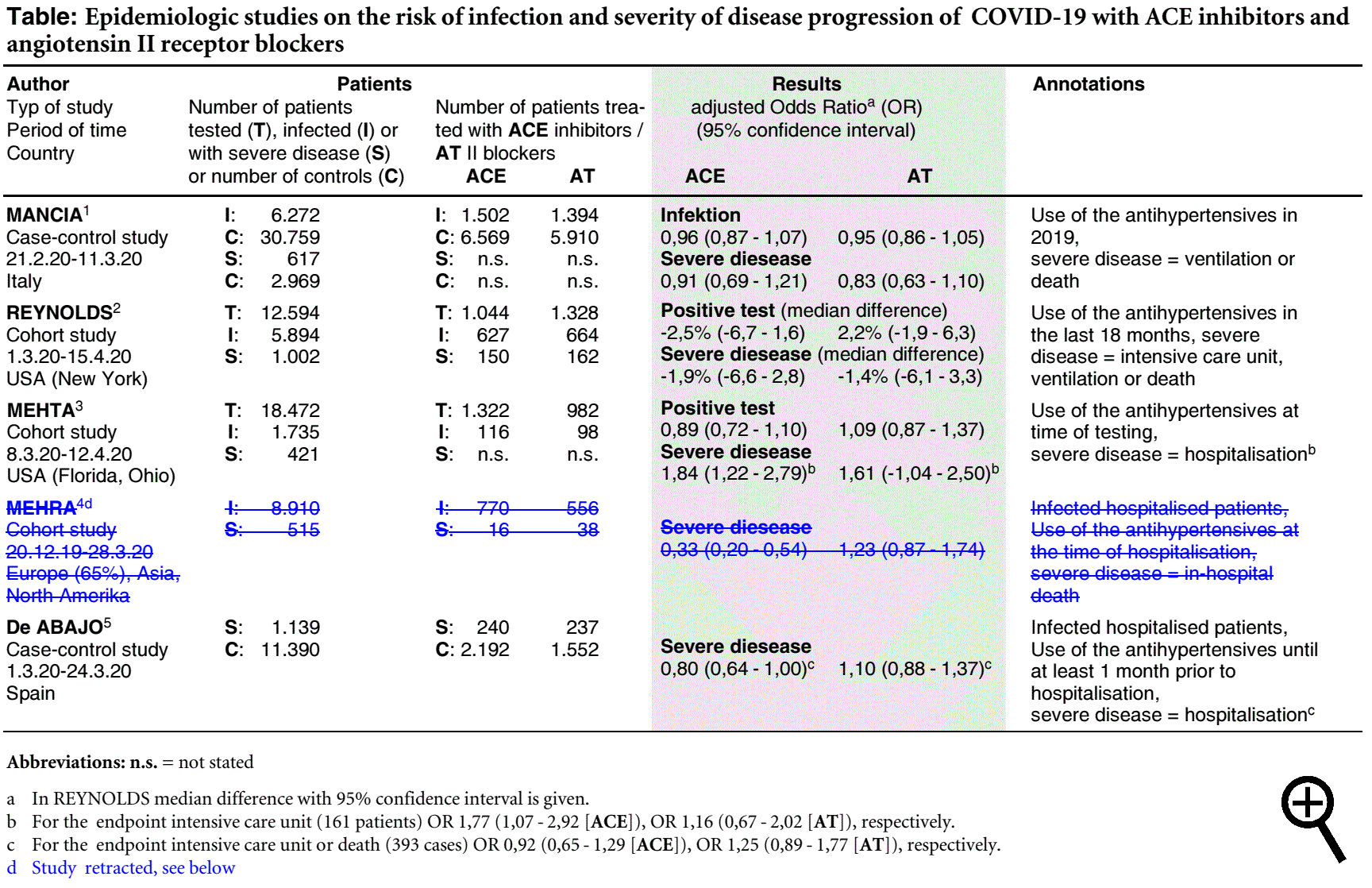Translation of a-t 2020; 51: 39-40
IN BRIEF
COVID-19 - Observational studies argue against the alleged risk of ACE inhibitors and sartans
See Update 5 June 2020.
A few weeks ago, hypotheses that ACE inhibitors and AT II receptor blockers increase the risk of infection with the novel coronavirus SARS-CoV-2 and could worsen the progression of the disease created a great deal of uncertainty among doctors and patients. In light of the lack of a sound scientific basis (even the data for this hypothesis are contradictory and there were no clinical trials), we and many expert associations have been strongly advising against switching to other anti-hypertensive drugs (a-t 2020; 51: 17-8). Several observational studies on the topic have now been published and argue against a risk caused by ACE inhibitors and sartans: three papers, one case control study (1) from Northern Italy and two cohort studies (2,3) from various regions in the USA have looked at the impact of the drugs on the risk of an infection and the likelihood of a positive test and have not identified a link (see table).

Two of these investigations (1,2) and two other papers (one cohort study (4) evaluating data from hospitals in Europe, Asia and the USA and one case control study (5) from Spain) were unable to identify an increased risk of a serious progression of COVID-19 (definitions included hospital admission, treatment in an intensive care ward, ventilation and/or death). Two Chinese studies (6,7) and a paper (8) from London, which has as yet only been published on a preprint server, came to the same conclusion, albeit they analysed smaller numbers of patients.* Only one of the two American studies (3) indicated negative effects of anti-hypertensive drugs, but this was also on the basis of comparatively few events: according to these results, patients taking ACE inhibitors or AT-II antagonists have a higher risk of being referred to hospital than those who do not use these drugs (421 events; adjusted Odds Ratio [OR] 1.84; 95% confidence interval [CI] 1.22-2.79 and OR 1.61; 95% CI 1.04-2.50, respectively). The likelihood of treatment in intensive care could also be increased in patients taking ACE inhibitors (161 events; OR 1.77; 95% CI 1.07-2.92). The study authors (3) and the accompanying editorial (9) both state, however, that these data should be interpreted with caution due to the small numbers of cases and the many opportunities for distortion. In light of the results of the other studies which (using different methods and in different populations) all give no indication of a negative effect on disease progression in patients taking ACE inhibitors and sartans, we continue to feel that there is no evidence of a harmful effect of these drugs with respect to COVID-19, -Ed.
| 1 | MANCIA, G. et al.: N. Engl. J. Med., publ. online on 1 May 2020 (10 pages); https://doi.org/10.1056/NEJMoa2006923 |
| 2 | REYNOLDS, H.R. et al.: N. Engl. J. Med., publ. online on 1 May 2020 (8 pages); https://doi.org/10.1056/NEJMoa2008975 |
| 3 | MEHTA, N. et al.: JAMA Cardiol., publ. online on 5 May 2020 (7 pages); https://doi.org/10.1001/jamacardio.2020.1855 |
| 4 | MEHRA, M.R. et al.: N. Engl. J. Med., publ. online on 1 May 2020 (8 pages); https://doi.org/10.1056/NEJMoa2007621 |
| 5 | De ABAJO, F.J. et al.: Lancet, publ. online on 14 May 2020 (10 pages); https://doi.org/10.1016/S0140-6736(20)31030-8 |
| 6 | ZHANG, P. et al.: Circ. Res., publ. online on 17 April 2020 (31 pages); https://doi.org/10.1161/CIRCRESAHA.120.317134 |
| 7 | LI, J. et al.: JAMA Cardiol., publ. online on 23 April 2020 (6 pages); https://doi.org/10.1001/jamacardio.2020.1624 |
| 8 | BEAN, D.M. et al.: medRxiv preprint, publ. online on 11 April 2020, version of 12 May 2020; https://doi.org/10.1101/2020.04.07.20056788 |
| 9 | THOMAS, L.E. et al.: JAMA Cardiol., publ. online on 5 May 2020 (3 pages); https://doi.org/10.1001/jamacardio.2020.1874 |
| * | An updated version (8) with substantially more patients has been published for the study from London, which continues to result in no risk increase with ACE inhibitors or sartans. We do not discuss this preprint here as the primary endpoint has been changed (intensive care unit or death within 21 days after start of symptoms compared to previously within 7 days) without comment. |
Update 5 June 2020
The study by MEHRA4 has been retracted by the authors on 4 June 2020 following concerns about the source and the validity of the data (cf. blitz-a-t 5 June 2020).11 This does not change our conclusions: we do not see evidence for the hypothesis of a harmful effect of ACE inhibitiors or AT II blockers in COVID-19, –Ed.
| 10 | MEHRA, M.R. et al.: N. Engl. J. Med., publ. online 4 June 2020; http://www.a-turl.de/?k=aumh |
| 11 | WATSON, J. et al.: An open letter to Mehra et al and The Lancet, 28 May 2020; https://doi.org/10.5281/zenodo.3862788 |
© arznei-telegramm (Berlin/Germany), May, 2020, protected by copyright laws.
Autor: Redaktion arznei-telegramm - Wer wir sind und wie wir arbeiten
Diese Publikation ist urheberrechtlich geschützt. Vervielfältigung sowie Einspeicherung und Verarbeitung in elektronischen Systemen ist nur mit Genehmigung des arznei-telegramm® gestattet.
